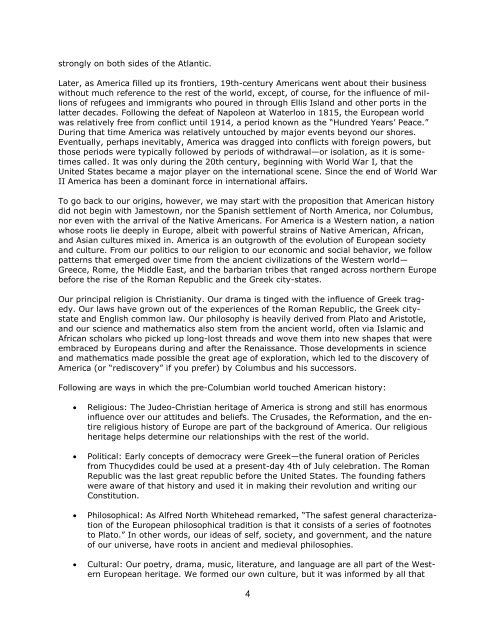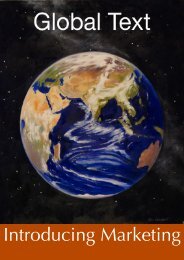- Page 1 and 2: U.S. History I: United States Histo
- Page 3 and 4: Preface Welcome to Academic America
- Page 5 and 6: Part 2: Era of the American Revolut
- Page 7 and 8: The Compromise of 1850 313 The Rise
- Page 9 and 10: INTRODUCTION TO AMERICAN HISTORY
- Page 11: Our Roots Are Deep and Wide: Americ
- Page 15 and 16: gious movement begun by Mohammed wh
- Page 17 and 18: The nature of warfare also illustra
- Page 19 and 20: drifted towards war. His successor,
- Page 21 and 22: difficult, to say the least, but th
- Page 23 and 24: spurred by conditions in England an
- Page 25 and 26: ancestors, and the things we admire
- Page 27 and 28: The point here is simply to observe
- Page 29 and 30: worship and systems of belief. Peop
- Page 31 and 32: limited sense, but that system also
- Page 33 and 34: Lessons of Virginia and Jamestown:
- Page 35 and 36: Arthur was unconsummated. Pope Juli
- Page 37 and 38: as evidenced by the violent conflic
- Page 39 and 40: Another example, as nearly pure and
- Page 41 and 42: Highlights of the Puritan Era: •
- Page 43 and 44: VIRGINIA-MASSACHUSETTS COMPARISONS.
- Page 45 and 46: feelings of Roger Williams himself,
- Page 47 and 48: Delaware The Delaware colony, named
- Page 49 and 50: armada, the colony was left to itse
- Page 51 and 52: did not entitle them to freedom. In
- Page 53 and 54: law of religious toleration, only t
- Page 55 and 56: The Enlightenment and America The p
- Page 57: on behalf of his family. If the hus
- Page 60 and 61: Colonial Legislatures • Colonial
- Page 62 and 63:
Note: The colonists had no objectio
- Page 64 and 65:
aggressive enforcement of duties, f
- Page 66 and 67:
Most colonists considered their par
- Page 68 and 69:
Appendix A: Selected Documents in C
- Page 70 and 71:
and in a triumphant manner led him
- Page 72 and 73:
For I am not half a quarter as stro
- Page 74 and 75:
There is a time also when a Christi
- Page 76 and 77:
servants, and cause their prayers t
- Page 78 and 79:
ought a large shallop with them out
- Page 80 and 81:
After these thing he returned to hi
- Page 82 and 83:
Fundamental Orders of Connecticut,
- Page 84 and 85:
9. It is Ordered … that the deput
- Page 86 and 87:
pieces, so that I was almost naked.
- Page 88 and 89:
Gottlieb Mittelberger’s Journey t
- Page 90 and 91:
Sinners in the Hands of an Angry Go
- Page 92 and 93:
Three Poems of Anne Bradstreet When
- Page 94 and 95:
Maryland Toleration Act, 1649 We of
- Page 96 and 97:
A Letter from New England To my lov
- Page 98 and 99:
misery, somehow made through the ne
- Page 100 and 101:
the extremity of the correction sho
- Page 102 and 103:
The American Revolution: 1763-1800
- Page 104 and 105:
Second, it has been argued in other
- Page 106 and 107:
the British colonists. The precario
- Page 108 and 109:
The story of the Battle of Fort Wil
- Page 110 and 111:
The influence of the Enlightenment
- Page 112 and 113:
• That His Majesty’s liege subj
- Page 114 and 115:
urned the schooner to the keel. Whe
- Page 116 and 117:
1775: The Real Revolution Begins—
- Page 118 and 119:
The Second Continental Congress The
- Page 120 and 121:
occupied the ground when the battle
- Page 122 and 123:
mander was met by a delegation from
- Page 124 and 125:
1776 had been less than successful.
- Page 126 and 127:
Saratoga and its aftereffects were
- Page 128 and 129:
and brutal; Clarke’s victories se
- Page 130 and 131:
go to France. Although the American
- Page 132 and 133:
Abigail Adams famously pleaded with
- Page 134 and 135:
Political Issues in the Early Feder
- Page 136 and 137:
Revolution and Empire. But even in
- Page 138 and 139:
Women also demanded the natural rig
- Page 140 and 141:
Making a New Government: The Road t
- Page 142 and 143:
gang up on them and, in effect, nib
- Page 144 and 145:
atified by the legislatures of thre
- Page 146 and 147:
“This country, with its instituti
- Page 148 and 149:
[transfer] of power took place was,
- Page 150 and 151:
created a new, stronger government
- Page 152 and 153:
George Washington as President: Set
- Page 154 and 155:
proper” arguments in the case of
- Page 156 and 157:
Evolved into Whigs in the Jackson y
- Page 158 and 159:
justices and instituted a number of
- Page 160 and 161:
The Federalists regained some popul
- Page 162 and 163:
perhaps spy on the Americans, that
- Page 164 and 165:
the White House in 1800. The Federa
- Page 166 and 167:
Documents for the Era of the Americ
- Page 168 and 169:
13. That it is the right of the Bri
- Page 170 and 171:
Resolves of the Continental Congres
- Page 172 and 173:
Patrick Henry: “Liberty or Death
- Page 174 and 175:
duced additional violence and insul
- Page 176 and 177:
The Sun never shined on a cause of
- Page 178 and 179:
and childishness. There was a time
- Page 180 and 181:
10. That general warrants, whereby
- Page 182 and 183:
A BILL FOR ESTABLISHING RELIGIOUS F
- Page 184 and 185:
Benjamin Franklin’s Final Speech
- Page 186 and 187:
Virginia Ratifying Convention June
- Page 188 and 189:
The Kentucky Resolutions, 1798 So b
- Page 190 and 191:
181
- Page 192 and 193:
the leaders—a “natural aristocr
- Page 194 and 195:
he was slow to deplore the violence
- Page 196 and 197:
frugal government, an admirable goa
- Page 198 and 199:
John Marshall is judged by lawyers
- Page 200 and 201:
enterprise that eventually led to h
- Page 202 and 203:
controlled the Atlantic and Mediter
- Page 204 and 205:
that the American flag created de f
- Page 206 and 207:
that those who needed her husband
- Page 208 and 209:
was the only territorial conquest r
- Page 210 and 211:
Nevertheless, American sailors were
- Page 212 and 213:
under American control. Another fle
- Page 214 and 215:
James Madison’s legacy is still b
- Page 216 and 217:
The Embargo of 1807-1809 and the Wa
- Page 218 and 219:
sity. (Interestingly, President Eis
- Page 220 and 221:
little controversy from 1789 to 181
- Page 222 and 223:
shunned British overtures, the effe
- Page 224 and 225:
his career he served as senator fro
- Page 226 and 227:
Marshall’s Leading Decisions 1803
- Page 228 and 229:
1824 Gibbons vs. Ogden Gibbons v. O
- Page 230 and 231:
With a divided vote, no candidate w
- Page 232 and 233:
y 1900), factories full of heavy ma
- Page 234 and 235:
capital was invested in manufacturi
- Page 236 and 237:
oad. In 1830 the Baltimore and Ohio
- Page 238 and 239:
The Age of Jacksonian Democracy Run
- Page 240 and 241:
ought votes directly, it certainly
- Page 242 and 243:
Jackson, a true Westerner at heart
- Page 244 and 245:
in Congress, and his opponents bega
- Page 246 and 247:
or Western interests, Webster also
- Page 248 and 249:
The Election of 1832 For the first
- Page 250 and 251:
push the fight any further, relente
- Page 252 and 253:
Foreign Affairs under Jackson. Fore
- Page 254 and 255:
Tocqueville received permission fro
- Page 256 and 257:
opinion may be tolerated where reas
- Page 258 and 259:
The Embargo Act: Jefferson’s Emba
- Page 260 and 261:
Our moderation and conciliation hav
- Page 262 and 263:
The late events in Spain and Portug
- Page 264 and 265:
… The Constitution is either a su
- Page 266 and 267:
The Court has bestowed on this subj
- Page 268 and 269:
etain forever the government of the
- Page 270 and 271:
South Carolina’s Protest Against
- Page 272 and 273:
ANDREW JACKSON: Proclamation to the
- Page 274 and 275:
Here is a law of the United States,
- Page 276 and 277:
ight in the people to reform their
- Page 278 and 279:
Andrew Jackson's Bank Veto The Bank
- Page 280 and 281:
Excerpts from Alexis de Tocqueville
- Page 282 and 283:
Any discussion of the political law
- Page 284 and 285:
Justice therefore forms the boundar
- Page 286 and 287:
Part 4: Expansion and War: The Unit
- Page 288 and 289:
The John Tyler Administration: A Pr
- Page 290 and 291:
American Foreign Relations in the T
- Page 292 and 293:
once.” 63 The trial, however, was
- Page 294 and 295:
self-determination. That situation
- Page 296 and 297:
perience, named him Major General o
- Page 298 and 299:
Manifest Destiny and Mexico After r
- Page 300 and 301:
land the United States took from Me
- Page 302 and 303:
City, where he paused, awaiting fre
- Page 304 and 305:
lating his instructions. “Polk wa
- Page 306 and 307:
The Barnburners—Democrats discont
- Page 308 and 309:
Social and Cultural Issues in the A
- Page 310 and 311:
The temperance movement was but one
- Page 312 and 313:
The Women’s Movement: Seneca Fall
- Page 314 and 315:
of Irish was as hostile as anything
- Page 316 and 317:
The Ante-Bellum South: Life on the
- Page 318 and 319:
Perhaps the best way to arrive at a
- Page 320 and 321:
cially children, and marriages betw
- Page 322 and 323:
world they must be in this. By an i
- Page 324 and 325:
America in the 1850s Slavery, State
- Page 326 and 327:
The slave trade (but not slavery) w
- Page 328 and 329:
disunion than the cry of "Health, h
- Page 330 and 331:
BEEN PROPOSED, because, while admit
- Page 332 and 333:
liberty laws to protect free blacks
- Page 334 and 335:
As the Whigs collapsed, a new party
- Page 336 and 337:
north of the Missouri Compromise li
- Page 338 and 339:
they saw themselves possible victor
- Page 340 and 341:
when you protect slavery in the Con
- Page 342 and 343:
in Illinois, would have agreed with
- Page 344 and 345:
Lincoln men worked to get him in th
- Page 346 and 347:
The Civil War, 1861-1865 Background
- Page 348 and 349:
merely heightened the crisis. By 18
- Page 350 and 351:
formed and the new government began
- Page 352 and 353:
ways; the British were not driven o
- Page 354 and 355:
First Battle of Bull Run/Manassas.
- Page 356 and 357:
vice in helping to keep Great Brita
- Page 358 and 359:
was waiting to combine forces with
- Page 360 and 361:
Lee had earned a reputation for cau
- Page 362 and 363:
On September 14 the Battle of South
- Page 364 and 365:
ignored. 97 The British were quite
- Page 366 and 367:
January 1 but had no immediate impa
- Page 368 and 369:
was too heavily engaged to break of
- Page 370 and 371:
intimidated. Union artillery, stock
- Page 372 and 373:
telegraph wires, destroyed bridges,
- Page 374 and 375:
As the third full year of fighting
- Page 376 and 377:
About the time that Sherman was beg
- Page 378 and 379:
Ford’s Theatre in Washington. Joh
- Page 380 and 381:
acres of land from both federal and
- Page 382 and 383:
THE AMERICAN CIVIL WAR: ADDITIONAL
- Page 384 and 385:
Unit Histories Hundreds of regiment
- Page 386 and 387:
These DECLARATIONS we solemnly avow
- Page 388 and 389:
It has, through its emissaries, inc
- Page 390 and 391:
The Mexican forces at Matamoras ass
- Page 392 and 393:
Views of Slavery In contrast to the
- Page 394 and 395:
nies of childbirth; others who had
- Page 396 and 397:
consequences of a dissolution of th
- Page 398 and 399:
I propose to bestow upon each of th
- Page 400 and 401:
part to act, not for my own securit
- Page 402 and 403:
eration should dishonor these ensig
- Page 404 and 405:
cestors did not leave things to “
- Page 406 and 407:
From John Brown, Last Speech in Cou
- Page 408 and 409:
urning shame to our country and age
- Page 410 and 411:
South Carolina Declaration, Decembe
- Page 412 and 413:
Abraham Lincoln First Inaugural Add
- Page 414 and 415:
is no single good reason for precip
- Page 416 and 417:
Sec. 2. (I) The citizens of each St
- Page 418 and 419:
amongst us. Many who hear me, perha
- Page 420 and 421:
And I further declare and make know
- Page 422 and 423:
which excepted parts, are for the p
- Page 424 and 425:
Fondly do we hope, fervently do we
- Page 426 and 427:
sert its authority, wherever it onc
- Page 428:
me to give them up and burn to ashe




